Category / Psychology
BU media coverage in Nepal
The article “Why suicide rate among pregnant women in Nepal is rising” written by BU academics was published in The Conversation last year. At the time this attracted Indian newspaper attention. Clearly it is still a relevant issue as it attracted national coverage in a Nepali newspaper this week.

Dr. Bibha Simkhada & Prof. Edwin van Teijlingen

CANDIDA YATES APPOINTED AS FOUNDING SCHOLAR OF THE BRITISH PSYCHOANALYTIC COUNCIL
Candida Yates has been appointed a Founding Scholar of the British Psychoanalytic Council. This is in recognition of her significant contribution to academic research in the area and beyond. The BPC is the professional registration body for the UK’s leading psychoanalytical practitioners. Up until recently, affiliations were open solely to qualified clinicians trained in the practice of psychoanalysis, psychoanalytical psychotherapy, and psychodynamic psychotherapy.
This newly created category expands the BPC’s purview by recognising the enormous contribution that academics and scholars have made to the study of psychoanalysis through research and publication. Being a Founding Scholar can open up further opportunities for debate, collaboration and knowledge exchange between the BPC, academia and beyond. The launch event was held at the Freud Museum in London on 21st February 2019.
As a Founding Scholar, Candida has now been invited to join the new organising committee for BPC Scholars to shape this new and exciting association going forward. She has also been invited to join the Editorial board of their members magazine ‘New Associations’: https://www.bpc.org.uk/new-associations.
Interdisciplinary and REF2021
 Over the past decades interdisciplinary or multidisciplinary research has grown in popularity. REF2021 promises that all types of research shall be assessed on a fair and equal basis, including interdisciplinary and collaborative research. New to REF 2021 compared to REF2014 is the Interdisciplinary Research Advisory Panel (IDAP) which has been established to advise the REF team and panel chairs on interdisciplinary research. Furthermore, REF2021 will: (1) appoint at least two members to specifically oversee the assessment of interdisciplinary research in each UoA (Unit of Assessment) to ensure equitable assessment; (2) allow universities to flag-up outputs in the submission system with an ‘interdisciplinary identifier’; and (3) require an discrete section in the environment template on the submitting UoA’s structures to support interdisciplinary research.
Over the past decades interdisciplinary or multidisciplinary research has grown in popularity. REF2021 promises that all types of research shall be assessed on a fair and equal basis, including interdisciplinary and collaborative research. New to REF 2021 compared to REF2014 is the Interdisciplinary Research Advisory Panel (IDAP) which has been established to advise the REF team and panel chairs on interdisciplinary research. Furthermore, REF2021 will: (1) appoint at least two members to specifically oversee the assessment of interdisciplinary research in each UoA (Unit of Assessment) to ensure equitable assessment; (2) allow universities to flag-up outputs in the submission system with an ‘interdisciplinary identifier’; and (3) require an discrete section in the environment template on the submitting UoA’s structures to support interdisciplinary research.
Many academics from all disciplines can at some point benefit from working with other scholars from other disciplines. Interdisciplinary research can bring new insights and understanding across disciplinary boundaries. Novel interdisciplinary research can transcend disciplinary boundaries to address sophisticated and so-called wicked problems in society. We would argue that some disciplines are more open to interdisciplinary approaches, and we would argue that the discipline of Public Health as a multi-faceted discipline is probably the most interdisciplinary of all.
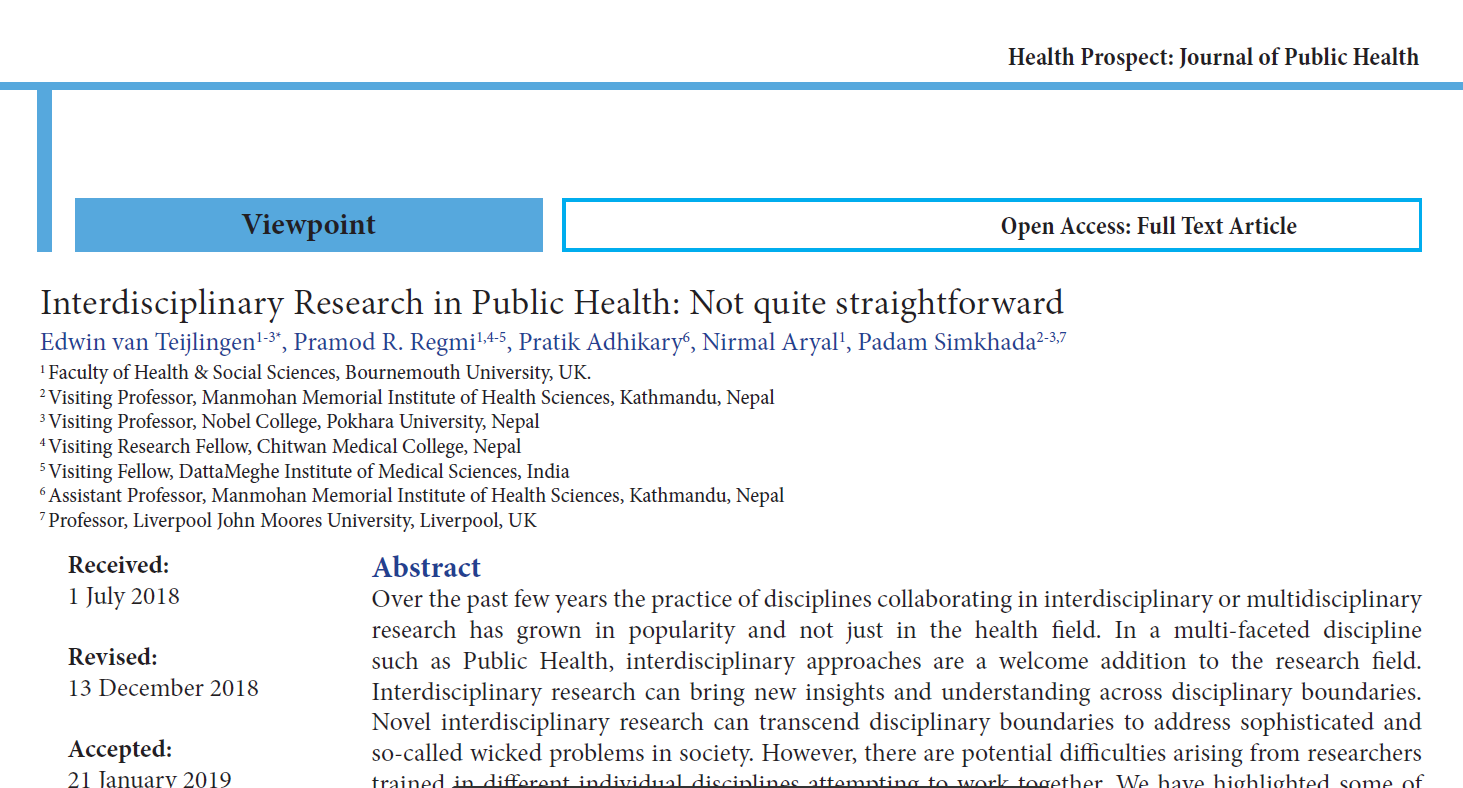
Having decades of research experience between us we also recognize that there can be difficulties arising from researchers trained in different individual disciplines trying to work together. We have highlighted some of these issues which interdisciplinary research in Public Health needs to consider and, where necessary, address before they become barriers in an article published this month in Health Prospect [1]. In this Open Access article we remind the reader that doing interdisciplinary research is not an easy option. Interdisciplinary research may involve a mixed-methods approach and could be underpinned by conflicting, and according to some incommensurable, research philosophies.
We argue, for example that in an interdisciplinary team topic specialists face potentially challenging demands on their range of skills and knowledge. For example, sociologists are required to have a broad knowledge at hand to represent the social science perspective in a study of a disease they know little about, designed by clinicians with a health services research outcome in mind. We also suggest that Public Health researchers have to be versed in both qualitative and quantitative methods. Working multidisciplinary or interdisciplinary means that they have to be able to understand the methods of the epidemiologists (e.g. ‘interrupted -time series’ or ‘nested-case control studies’) and those of health service researchers (e.g. ‘double-blind randomised controlled trials’) and have the whole range of qualitative methods at your command to improve the quality of the overall study.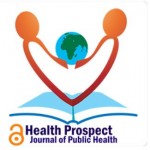
Prof. Edwin van Teijlingen, Dr. Pramod Regmi & Dr. Nirmal Aryal
(all based in the Faculty of Health & Social Sciences)
Dr. Pratik Adhikary &Prof. Padam Simkhada
(both BU Visiting Faculty)
Reference:
- van Teijlingen, E., Regmi, P., Adhikary, P., Aryal, N., Simkhada, P. (2019). Interdisciplinary Research in Public Health: Not quite straightforward. Health Prospect, 18(1), 4-7.
NIHR Programme Grants for Applied Research (PGfAR) Roadshow – 10th April 2019
NIHR Programme Grants for Applied Research (PGfAR) Roadshow
We are offering a number of events which offer an opportunity to gain a greater understanding of the NIHR Programme Grants for Applied Research (PGfAR) and Programme Development Grant (PDG) funding streams.
Registration to these events will be FREE and refreshments will be provided.
The next event taking place in the South is in Exeter, Devon. 10 April 2019.
Places are limited and will be allocated on a ‘first come, first served’ basis. In order to secure your place at our South West event in Exeter, please register using our online form by 1pm, 27 March 2019.
Researchers currently developing, or considering developing, a proposal for submission to PGfAR or PDG for funding are also invited to take advantage of a one to one session (subject to availability) with the NIHR Programme team and RDS staff to discuss their proposed study. To access this opportunity please complete the one to one booking form.
And don’t forget, your local branch of the NIHR RDS (Research Design Service) is based within the BU Clinical Research Unit (BUCRU) on the 5th floor of Royal London House. Feel free to pop in and see us, call us on 61939 or send us an email.
Expanding BU’s India links
Dr. Pramod Regmi and Prof. Edwin van Teijlingen (both in the Faculty of Health & Social Sciences) have been invited to join the scientific committee of the International Conference on Mixed Methods Research [ICMMR-2019]. This year’s ICMMR conference will be held in the School of Behavioural Sciences at the Mahatma Gandhi University in Kottayam (India) on February 22-24, 2019. The two BU academics will run an online panel discussion session on academic publishing under the heading “Meet the editors.” The advantage of such online session is that BU academic don’t have to travel to India saving time and money as well as the environment. This has benefits for their own work-live balance as well as their carbon footprint. 
BU focuses its global collaborations on three geographical areas, one of these is the Indian sub-continent. Connect India is BU’s strategic Hub of Practice for the Indian sub-continent, bringing together a community of researchers, educators, practitioners and students at Bournemouth University to collaborate with colleagues in India and Nepal.
New textbook for medical students
Experts from universities across the UK have contributed to a new edition of a best-selling textbook which is out this month. This is the fourth edition of Psychology and Sociology Applied to Medicine which is a jargon-free 179-page introduction to psychology and sociology for medical students (and other health care students). The book is published by one of the largest academic publishers in the world, Elsevier in its series of Illustrated Colour Texts.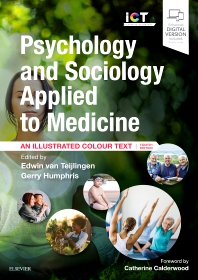
Seventy-three academics contributed chapters to the book which was edited by psychologist Prof. Gerry Humphris (University of St. Andrews) and sociologist Prof. Edwin van Teijlingen (Bournemouth University). The contributors are discipline and topic experts and come mainly from the UK but some are from further afield such as Ireland and Australia. Compared to the third edition this latest edition has 45 new authors, who contribute the most up-to-date knowledge on classical psychological and sociological concepts and issues. All chapters have been updated and several have been renamed and revamped to reflect changes in society, and three new ones have been added. The editors are very grateful to Catherine Calderwood, Chief Medical Officer for Scotland, for writing the Foreword.
Teaching behavioural and social sciences to students is of vital importance for good health care in the future. This textbook covers topics across the life cycle from birth to death. A range of concepts and issues such as health screening, personality & health, quality of life, self-care, and anxiety are explained in an easy to understand fashion. This makes the textbook excellent introductory text as well as an essential revision tool for students. This textbook for medical students is Bournemouth University’s latest contribution to medical training.
Reference:
van Teijlingen, E. & Humphris, G. (Eds.) (2019)Psychology & Sociology Applied to Medicine: An Illustrated Colour Text (4th Edn), Edinburgh: Elsevier The book is available as eBook [ISBN: 9780702062995] and as paperback [ISBN: 9780702062988].
Reflections on doing interdisciplinary research
 Conducting interdisciplinary or even transdisciplinary research has become more to the fore in many academic fields. As a result of the steady rise of multidisciplinary research It has been made more explicit in REF 2021 [1]. For example, REF 2021 UoA 2 Public Health, Health Services & Primary Care “recognises the breadth and diverse range of single, multidisciplinary and/or multi-professional research across public health, health services and primary care”, whilst UoA22 Anthropology & Development Studies states that its submissions “can be multidisciplinary or interdisciplinary and may combine social science with other disciplines”.
Conducting interdisciplinary or even transdisciplinary research has become more to the fore in many academic fields. As a result of the steady rise of multidisciplinary research It has been made more explicit in REF 2021 [1]. For example, REF 2021 UoA 2 Public Health, Health Services & Primary Care “recognises the breadth and diverse range of single, multidisciplinary and/or multi-professional research across public health, health services and primary care”, whilst UoA22 Anthropology & Development Studies states that its submissions “can be multidisciplinary or interdisciplinary and may combine social science with other disciplines”.
However, doing multidisciplinary research is not without its problems (and barriers). In a paper accepted today we reflect on some of these issues [2]. The co-authors are Bournemouth University’s Dr. Pramod Regmi, Dr. Nirmal Ayral and Prof. Edwin van Teijlingen, and BU Visiting Professor Padam Simkhada (Public Health Institute, Liverpool John Moores University) and BU graduate Dr. Pratik Adhikary (Green Tara Nepal). We all are Public Health researchers, with very different educational backgrounds and training, reflecting the diversity of and interdisciplinarity in the field. Several of us have a first degree in Education or Health Education, but one has a first degree in Sociology. Whilst four of the five authors have Master degree in Public Health and/or Health Promotion, two have a Master in Education. Most of us have a Ph.D. in Public Health, but again one of us has a Ph.D. in Sociology. Our paper ‘Interdisciplinary Research in Public Health: Not quite straightforward’ has been accepted by the journal Health Prospect [2]. The advantage of this journal, which is part of the NepJOL family is that it is Open Access and hence freely available for anybody working in Public Health across the globe.
Prof. Edwin van Teijlingen
Centre for Midwifery, Maternal & Perinatal Health (CMMPH)
Reference:
- REF 2021 (2018) Consultation on the draft panel criteria and working methods https://www.ref.ac.uk/media/1013/consultation-on-the-draft-panel-criteria-and-working-methods-ref-2018_02.pdf
- van Teijlingen, E., Regmi, P.R., Adhikary, P., Aryal, N., Simkhada, P. (2019) Interdisciplinary Research in Public Health: Not quite straightforward, Health Prospect (forthcoming)
Migrant workers & mental health in Nepal
 Congratulations to Dr. Nirmal Aryal and Dr. Pramod Regmi in BU’s Faculty of Health & Social Sciences on the acceptance of their latest paper ‘Adolescents left behind by migrant workers: Call for community-based mental health interventions in Nepal’ [1]. This paper has just been accepted by WHO South East Asia Journal of Public Health. This academic journal is Open Access and published by the Regional Office for South-East Asia of the World Health Organization (WHO) in Delhi, India. Co-authors of this scientific paper are: Prof. Edwin van Teijlingen in the Centre for Midwifery, Maternal & Perinatal Health (CMMPH); BU Visiting Prof. Padam Simkhada (based at Liverpool John Moores University);and Dr. Pashupati Mahat from CMC-Nepal (Center for Mental Health & Counselling- Nepal).
Congratulations to Dr. Nirmal Aryal and Dr. Pramod Regmi in BU’s Faculty of Health & Social Sciences on the acceptance of their latest paper ‘Adolescents left behind by migrant workers: Call for community-based mental health interventions in Nepal’ [1]. This paper has just been accepted by WHO South East Asia Journal of Public Health. This academic journal is Open Access and published by the Regional Office for South-East Asia of the World Health Organization (WHO) in Delhi, India. Co-authors of this scientific paper are: Prof. Edwin van Teijlingen in the Centre for Midwifery, Maternal & Perinatal Health (CMMPH); BU Visiting Prof. Padam Simkhada (based at Liverpool John Moores University);and Dr. Pashupati Mahat from CMC-Nepal (Center for Mental Health & Counselling- Nepal).
The paper argues that there exists an increased risk of mental health problems in Nepali adolescents, especially those left-behind by migrant workers. There is a paucity of research on mental health intervention among adolescents in low and middle income countries (LMICs) such as Nepal. The paper calls for more and better community-based mental health intervention in Nepali adolescents including the special group of left-behind adolescents. Doing this work in Nepal, a country with a very high proportion of its population working abroad will have a broader implication for a other low-and middle-income countries. This article is a welcome addition to BU’s growing publications on migrant workers and health in Nepal [2-11].
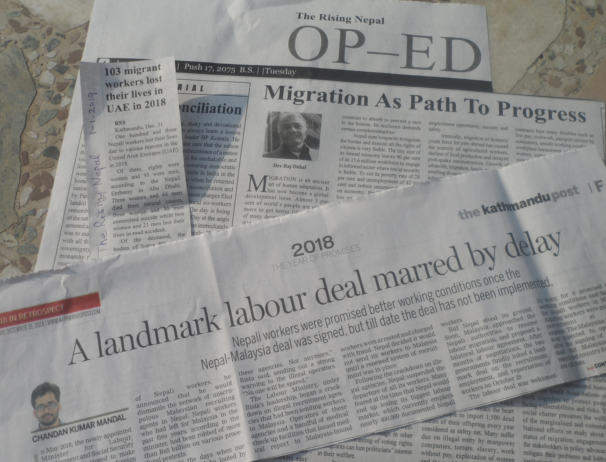
References:
- Aryal, N., Regmi, P. van Teijlingen, E., Simkhada, P & Mahat, P. (2019) Adolescents left behind by migrant workers: Call for community-based mental health interventions in Nepal, WHO South East Asia J Public Health (forthcoming).
- Adhikary P, Sheppard Z., Keen S. van Teijlingen E (2018) Health and well-being of Nepalese migrant workers abroad, Int J Migration, Health Social Care 14(1): 96-105
- Simkhada, P.P., van Teijlingen, E.R., Gurung, M., Wasti, S. (2018) A study of Health Problems of Nepalese Female Migrants Workers in the Middle-East & Malaysia, BMC International Health & Human Rights 18(1):4.
- Adhikary, P., Sheppard, Z., Keen, S., van Teijlingen, E. (2017) Risky work: Accidents among Nepali migrant workers in Malaysia, Qatar and Saudi, Health Prospect 16(2): 3-10
- Simkhada, P, Regmi, P., van Teijlingen E., Aryal, N. (2017) Identifying gaps in Nepalese migrant workers’ health & well-being: A review of literature J Travel Med 24(4): 1-9
- Aryal, N., Regmi, PR., van Teijlingen, E., Simkhada, P., Adhikary, P., Bhatta, YKD., Mann, S. (2016) Injury & Mortality in Young Nepalese Migrant Workers: A Call for Public Health Action. Asian-Pacific Journal of Public Health 28(8): 703-705.
- Aryal, N., Regmi, PR., van Teijlingen, E., Dhungel, D., Ghale, G., Bhatta, GK. (2016) Knowing is not enough: Migrant workers’ spouses vulnerability to HIV SAARC Journal of Tuberculosis, Lung Diseases & HIV/AIDS 8(1):9-15.
- Sapkota, T., Simkhada, P., van Teijlingen, E. (2014) Nepalese health workers’ migration to United Kingdom: A qualitative study. Health Sci J 8(1):57-74.
- Adhikary P, Keen S, van Teijlingen E. (2011) Health Issues among Nepalese migrant workers in Middle East. Health Sci J 5: 169-75.
- van Teijlingen E, Simkhada, P, Adhikary P. (2009) Alcohol use among the Nepalese in UK. BMJ Rapid Response www.bmj.com/cgi/eletters/339/oct20_1/b4028#223451
- Adhikary, P., Simkhada, P., van Teijlingen, E., Raja, A. (2008). Health and Lifestyle of Nepalese Migrants in the UK; BMC International Health & Human Rights, 8(6).
Migration research dissemination in Kathmandu
Last week we presented key findings from 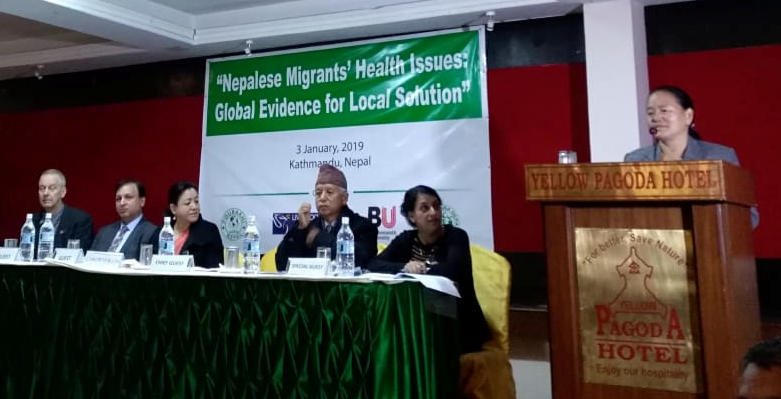 our various research projects on health and migration in Nepal. The research meeting was held in a hotel in central Kathmandu. More than seventy people turned up, in fact more people than had registered so the kitchen had to add to the lunch buffet at short notice. The chief guest was the Deputy Speaker of the Nepal’s Federal Parliament, Shivamaya Tumbahangphe. Dr. Tumbahangphe was the first female MP in Nepal with a PhD (in Political Sciences). She is speaking on the photo right, standing next to BU’s Dr. Bibha Simkhada.
our various research projects on health and migration in Nepal. The research meeting was held in a hotel in central Kathmandu. More than seventy people turned up, in fact more people than had registered so the kitchen had to add to the lunch buffet at short notice. The chief guest was the Deputy Speaker of the Nepal’s Federal Parliament, Shivamaya Tumbahangphe. Dr. Tumbahangphe was the first female MP in Nepal with a PhD (in Political Sciences). She is speaking on the photo right, standing next to BU’s Dr. Bibha Simkhada.
The event was organised jointly with Liverpool John Moores University, Green Tara Nepal, and POURAKHI Nepal. the latter is an organisation of women migrant workers established in 2003.  It aims to ensure the rights of women migrant workers and their families in the entire process of migration. The organisation focuses its work on women migrant worker’s concerns regarding issues that arise at the different stages of migration, namely pre-employment, pre-departure, employment and post-arrival periods through support programmes.
It aims to ensure the rights of women migrant workers and their families in the entire process of migration. The organisation focuses its work on women migrant worker’s concerns regarding issues that arise at the different stages of migration, namely pre-employment, pre-departure, employment and post-arrival periods through support programmes.
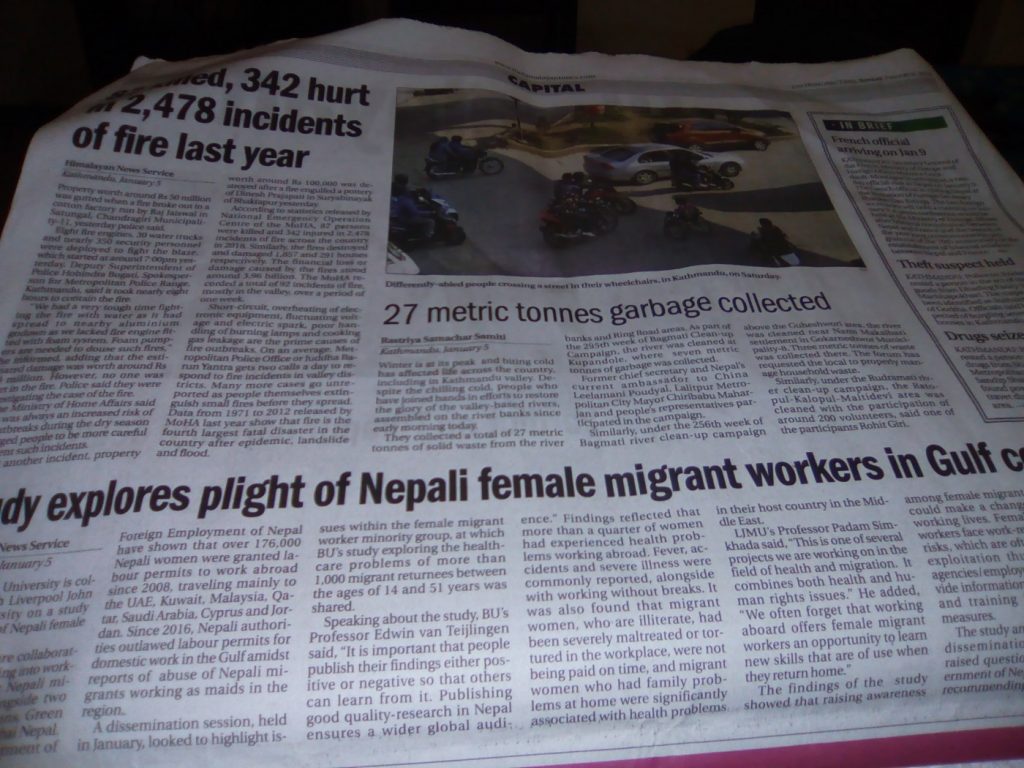 Nearly one-seventh of the world’s population is now living in a location different from the one in which they were born. Some 3.5 million Nepali are working as migrant workers in the Gulf countries, Malaysia, and India, contributing nearly one-third of the Nepal’s gross domestic product. Despite Nepal’s long history of work-related migration, the national dialogue has only recently become more prominent. Migration has become a political as well as a social issues, for example, we see migration mentioned in the national media on a daily basis. Our meeting was reported on TV and in an English-language newspaper The Himalayan Times on January 6th (to read article click here!).
Nearly one-seventh of the world’s population is now living in a location different from the one in which they were born. Some 3.5 million Nepali are working as migrant workers in the Gulf countries, Malaysia, and India, contributing nearly one-third of the Nepal’s gross domestic product. Despite Nepal’s long history of work-related migration, the national dialogue has only recently become more prominent. Migration has become a political as well as a social issues, for example, we see migration mentioned in the national media on a daily basis. Our meeting was reported on TV and in an English-language newspaper The Himalayan Times on January 6th (to read article click here!).
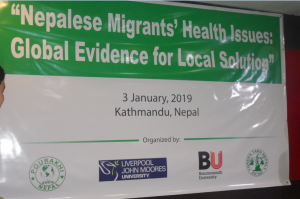
The BU team comprises: Dr Pramod Regmi (FHSS Lecturer in International Health), Dr. Nirmal Aryal (Post-doctoral Research Fellow), Dr. Bibha Simkhada (FHSS Lecturer in Nursing), and in the Centre for Midwifery, Maternal & Perinatal Health (CMMPH) Dr. Catherine Angell and Prof. Edwin van Teijlingen. The team is complemented by Liverpool John Moores University’s Prof. Padam Simkhada (who is also Visiting Professor at BU), Dr. Pratik Adhikary (BU graduate based at Green Tara Nepal) and colleagues at Datta Meghe Institute of Medical Sciences, India.
Developing our partnership in Nepal
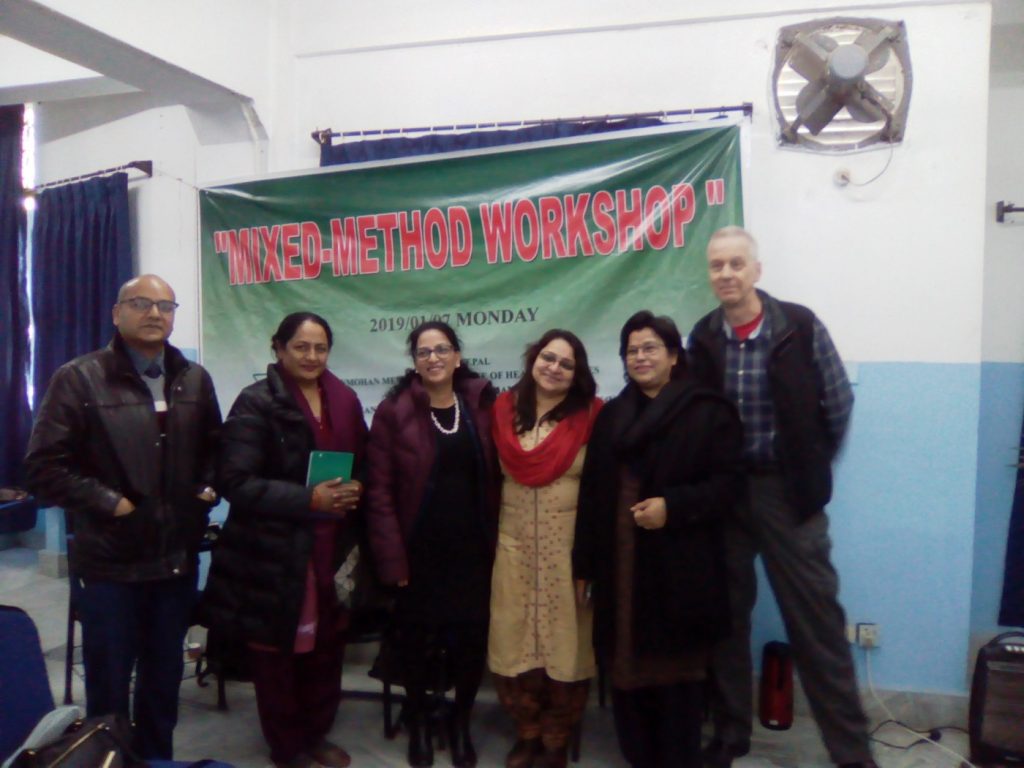 Last year BU signed a Memorandum of Agreement (MoA) with Manmohan Memorial Institute of Health Sciences (MMIHS) in Kathmandu, Nepal. This week Dr. Bibha Simkhada, Lecturer in Nursing, Dr. Shanti Shanker, Lecturer (Academic) in Psychology, and Prof. Edwin van Teijlingen in the Centre for Midwifery, Maternal & Perinatal Health (CMMPH) delivered one-day workshop on qualitative and mixed-methods research approaches. The workshop was very well attended by MSc students, not just from MMIHS, but also those from several other colleges and universities.
Last year BU signed a Memorandum of Agreement (MoA) with Manmohan Memorial Institute of Health Sciences (MMIHS) in Kathmandu, Nepal. This week Dr. Bibha Simkhada, Lecturer in Nursing, Dr. Shanti Shanker, Lecturer (Academic) in Psychology, and Prof. Edwin van Teijlingen in the Centre for Midwifery, Maternal & Perinatal Health (CMMPH) delivered one-day workshop on qualitative and mixed-methods research approaches. The workshop was very well attended by MSc students, not just from MMIHS, but also those from several other colleges and universities.
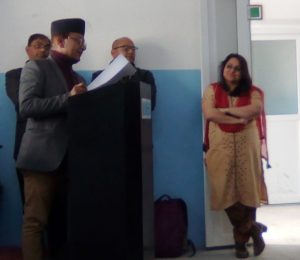 MMIHS is part of BU’s latest bids for ERASMUS Higher Education Student & Staff Mobility between Programme and Partner Countries (Key Action 107) – International Credit Mobility. Bournemouth University’s strategic plan known as BU2015 has as one of its pillars our desire to “enrich society by having a significant impact on challenges world-wide“. Through Fusion BU aims to (a) have a positive impact world-wide on the challenges facing society; (b) ensure staff, students and graduates enrich society as active citizens in their communities; and (c) strengthen our shared impact through worldwide partnerships. Expanding and developing the existing BU-MMIHS partnership is a excellent stepping stone for the ERASMUS application.
MMIHS is part of BU’s latest bids for ERASMUS Higher Education Student & Staff Mobility between Programme and Partner Countries (Key Action 107) – International Credit Mobility. Bournemouth University’s strategic plan known as BU2015 has as one of its pillars our desire to “enrich society by having a significant impact on challenges world-wide“. Through Fusion BU aims to (a) have a positive impact world-wide on the challenges facing society; (b) ensure staff, students and graduates enrich society as active citizens in their communities; and (c) strengthen our shared impact through worldwide partnerships. Expanding and developing the existing BU-MMIHS partnership is a excellent stepping stone for the ERASMUS application.
Prof. Edwin van Teijlingen
Congratulations to FHSS student Raksha Thapa
On the last working day of 2018 at Bournemouth University we congratulate FHSS student Raksha Thapa on the publication of her first PhD paper in her first PhD year. The paper Uptake of Health Services by People from the Dalit Community was published today in the Journal of BP Koirala Institute of Health Sciences [1]. Raksha is supervised by Dr. Pramod Regmi, Dr. Vanessa Heaslip and Prof. Edwin van Teijlingen.
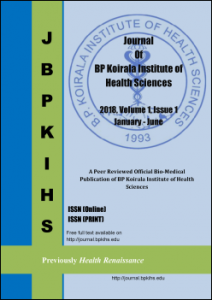
The paper discusses a variety of studies and reports on the uptake of health services in Nepal and other low-income countries by socio-economic cultural status in South Asia. These reports often focus on limitations due to physical factors, such as travel distance to health facility, or lack of medical facilities or electricity at the health care centre or focus on resources, such as lack of service providers, or lack of appropriately trained staff. Therefore, this article highlights the importance of discrimination as a reason for people not seeking available health care. Discrimination is particularly a barrier to service usage among the most deprived people in society, such as the Dalit community in Nepal and South Asia more generally. The authors discuss the caste-based discrimination in Nepal and its effects on health outcomes of those groups who experience such discrimination.
Reference:
- Thapa, R., van Teijlingen, E., Regmi, P. , Heaslip, V. (2018) Uptake of Health Services by People from the Dalit Community, Journal of BP Koirala Institute of Health Sciences 1(2): 1-6.
From one NIHR Fellowship to another!
From one NIHR Fellowship to another!
This week I complete my 3-year, 100% FTE NIHR Career Development Fellowship. After the Christmas holiday I then start on a new NIHR Clinical Trials Fellowship.
If you’re not familiar with NIHR fellowships you can find out more here: https://www.nihr.ac.uk/our-research-community/NIHR-academy/nihr-training-programmes/fellowship-programme.htm. The NIHR have re-packaged their fellowship programme and so the Career Development Fellowship is no longer available, as it has been superseded with an Advanced Fellowship.
The Career Development Fellowship has been a career-changing experience. It not only provides you with funding to lead a multidisciplinary team to conduct a research project of importance, but the opportunity to undertake a training and development programme. This has enabled me to further develop my skills and expertise in clinical trial research methods so that I can undertake larger, more complex studies, and therefore go on to produce much higher quality work with greater impact.
The new fellowship that I will start in January 2019 is a Clinical Trials Fellowship. These are designed to provide further advanced research methods training in clinical trials. They provide hands-on experience with several trials at different phases of progression and are to be based in a clinical trials unit. For me, I will be based at PRIMENT, the Clinical Trials Unit at UCL with expertise in trials conducted in primary care and to do with mental health, including my area of dementia. This will help consolidate the experience I have gained so far and training from completing an MSc in Clinical Trials, with further hands-on experience in dementia trials at a leading trials unit.
I can highly recommend NIHR fellowships and happy to discuss them with colleagues interested in applying for one.
Dr Samuel Nyman
REF Internal Review Panels – Recruiting Now!

To help us prepare for our upcoming submission to the Research Excellence Framework (REF) 2021 we are establishing a number of internal review panels to review and assess BU’s research outputs and impact case studies.
Expressions of Interest (EoI) are invited from academic staff who are interested in being a Panel Member. There will be one panel per Unit of Assessment (UOA) listed below. Those interested should identify which UOA Panel they would like to be considered for and put forward a short case (suggested length of one paragraph) as to why they are interested in the role and what they think they could bring to it. EoIs should be emailed to ref@bournemouth.ac.uk by 14th December 2018.
UOA Teams would particularly welcome EoIs from those who have:
- Experience reviewing for previous REF stocktake exercises
- Experience in editorship
- Experience peer review
Full details of the role, the process of recruitment and terms of reference for the panels themselves can be found here.
Any queries regarding a specific panel should be directed to the UOA Leader. General enquiries should be directed to Shelly Anne Stringer, RKEO.
| Unit of Assessment | UOA Leader(s) | |
| 2 | Public Health, Health Services and Primary Care | Prof. Edwin Van Teijlingen |
| 3 | Allied Health Professions, Dentistry, Nursing and Pharmacy | |
| 4 | Psychology, Psychiatry and Neuroscience | Dr. Peter Hills |
| 11 | Computer Science and Informatics | Prof. Hamid Bouchachia |
| 12 | Engineering | Prof. Zulfiqar Khan |
| 14 | Geography and Environmental Studies | Prof. Rob Britton |
| 15 | Archaeology | Prof. Kate Welham and Prof. Holger Schutkowski |
| 17 | Business and Management Studies | Prof. Dean Patton |
| 18 | Law | Dr Sascha-Dominik Bachman |
| 20 | Social Work and Social Policy | Prof. Jonathan Parker |
| 23 | Education | Prof. Julian McDougall and Prof. Debbie Holley |
| 24 | Sport and Exercise Sciences, Leisure and Tourism | Prof. Tim Rees (Sport) Prof. Adam Blake (Tourism) |
| 27 | English Language and Literature | Prof. Bronwen Thomas |
| 32 | Art and Design: History, Practice and Theory | Prof. Jian Chang |
| 33 | Music, Drama, Dance, Performing Arts, Film and Screen Studies | Prof. Kerstin Stutterheim |
| 34 | Communication, Cultural and Media Studies, Library and Information Management | Prof. Iain MacRury |
National media coverage in Nepal
 Congratulations to FHSS Dr. Pramod Regmi & Dr. Nirmal Aryal on their media appearance yesterday in a national English-language newspaper Republica. The newspaper article covers one of the key social issues in Nepal today namely migration, especially for work. Moreover, there was a different story on the Britain-Nepal health and medical relationship over the past fifty year. This feature article appeared on BBC Nepali (if you can read Nepali click here !).
Congratulations to FHSS Dr. Pramod Regmi & Dr. Nirmal Aryal on their media appearance yesterday in a national English-language newspaper Republica. The newspaper article covers one of the key social issues in Nepal today namely migration, especially for work. Moreover, there was a different story on the Britain-Nepal health and medical relationship over the past fifty year. This feature article appeared on BBC Nepali (if you can read Nepali click here !). 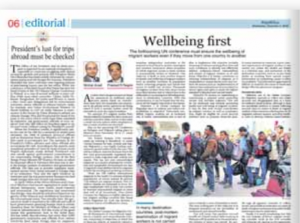
In FHSS we have been working on health and migration issues in Nepal and the health and well-being of Nepali migrant workers abroad for over ten years, resulting in numerous publications [1-9].
Well done!
Prof. Edwin van Teijlingen
CMMPH
References:
- Adhikary P, Sheppard, Z., Keen S., van Teijlingen E. (2018) Health and well-being of Nepalese migrant workers abroad, International Journal of Migration, Health & Social Care 14(1): 96-105, https://doi.org/10.1108/IJMHSC-12-2015-0052
- Simkhada, P.P., van Teijlingen, E.R., Gurung, M., Wasti, S. (2018) A study of Health Problems of Nepalese Female Migrants Workers in the Middle-East and Malaysia, BMC International Health & Human Rights 18(1):4. doi: 10.1186/s12914-018-0145-7.
- van Teijlingen E, Simkhada, P., Adhikary, P. (2009) Alcohol use among the Nepalese in the UK BMJ Rapid Response: www.bmj.com/cgi/eletters/339/oct20_1/b4028#223451
- Adhikary P., Keen S., van Teijlingen, E. (2011) Health Issues among Nepalese migrant workers in Middle East. Health Science Journal 5: 169-175. www.hsj.gr/volume5/issue3/532.pdf
- Adhikary, P., Sheppard, Z., Keen, S., van Teijlingen, E. (2017) Risky work: Accidents among Nepalese migrant workers in Malaysia, Qatar and Saudi, Health Prospect 16(2): 3-10.
- Aryal, N., Regmi, PR., van Teijlingen, E., Simkhada, P., Adhikary, P., Bhatta, YKD., Mann, S. (2016) Injury and Mortality in Young Nepalese Migrant Workers: A Call for Public Health Action. Asian-Pacific Journal of Public Health 28(8): 703-705.
- Simkhada, PP., Regmi, PR., van Teijlingen, E., Aryal, N. (2017) Identifying the gaps in Nepalese migrant workers’ health & well-being: A review of the literature, Journal of Travel Medicine 24 (4): 1-9.
- Aryal, N., Regmi, PR., van Teijlingen, E., Dhungel, D., Ghale, G., Bhatta, GK. (2016) Knowing is not enough: Migrant workers’ spouses vulnerability to HIV SAARC Journal of Tuberculosis, Lung Diseases & HIV/AIDS 8(1):9-15.
- Sapkota, T., Simkhada, P., van Teijlingen, E. (2014) Nepalese health workers’ migration to United Kingdom: A qualitative study. Health Science Journal 8(1):57-74.
#TalkBU next Thursday (6 December) – Are you a Phoebe or a Monica? Improving your ability to communicate

#TalkBU is a monthly lunchtime seminar on Talbot Campus, open to all students and staff at Bournemouth University and free to attend. Come along to learn, discuss and engage in a 20-30 minute presentation by an academic or guest speaker talking about their research and findings, with a Q&A to finish.
Being able to understand the characteristics and behaviours of different types of personality can help you understand the people you are interacting with, as well as yourself. Join us in the exploration of personality profiles, using Jelly Babies to help change the way you view people.
In this talk, Amanda Wilding, will be discussing her research, which centres around understanding different personalities and the benefit this can have to our social interactions
When: 6th December 2018
Where: FG04, Ground Floor, Fusion Building
Register here to attend
BU PhD student PROSPERO publication
Congratulations to BU PhD student Dimitrios Vlachos who had his PROSPERO protocol published [1]. Dimitrios working on a project promoting the Mediterranean-style diet in childbearing age, he is supervised across faculties by Dr. Fotini Tsofliou and Prof. Katherine Appleton.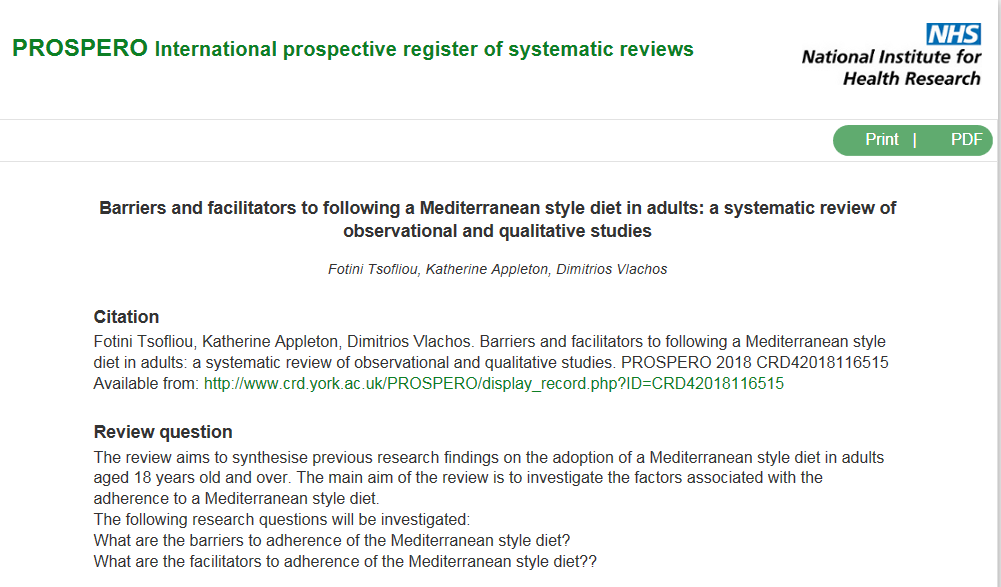
Well done!
Prof. Edwin van Teijlingen
Centre for Midwifery, Maternal & Perinatal Health (CMMPH)
Reference:
- Tsofliou, F., Appleton, K., Vlachos, D. (2018) Barriers and facilitators to following a Mediterranean style diet in adults: a systematic review of observational and qualitative studies. PROSPERO 2018 CRD42018116515
Congratulations to Denyse King
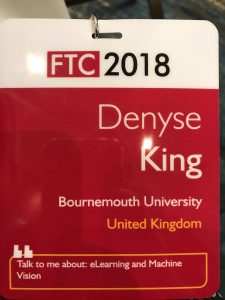 Congratulations to Denyse King, who is currently attending the Future Technologies Conference, FTC 2018; Vancouver, BC; Canada (15-16 November). Her conference paper ‘NoObesity apps – From approach to finished app’ has been published in Advances in Intelligent Systems and Computing [1]. Denyse is part of the Centre for Midwifery, Maternal & Perinatal Health (CMMHP) where she is a Lecturer (Academic) in Midwifery based at BU’s campus in Portsmouth ,
Congratulations to Denyse King, who is currently attending the Future Technologies Conference, FTC 2018; Vancouver, BC; Canada (15-16 November). Her conference paper ‘NoObesity apps – From approach to finished app’ has been published in Advances in Intelligent Systems and Computing [1]. Denyse is part of the Centre for Midwifery, Maternal & Perinatal Health (CMMHP) where she is a Lecturer (Academic) in Midwifery based at BU’s campus in Portsmouth ,
Obesity is still a growing public health problem in the UK and many healthcare workers find it challenging to have a discussion with service users about this sensitive topic. They also feel they are not competent to provide the relevant heath advice and are seeking easily accessible, evidence-based, mobile health learning (mHealth). mHealth applications (apps) such as the Professional NoObesity and Family NoObesity (due for release late 2018), have been designed to: support families with making sustainable positive behaviour changes to their health and well-being, ease pressure on practitioners’ overweight and obesity care related workloads, as well as to support the education of professionals, students and service users. This paper describes the process of designing the apps from the inception of the idea, through the stages of research, app builds and testing. The processes of collaborative working to design and develop the apps to meet the needs of both service users and health professionals will also be reflected upon. Childhood obesity is an complex problem and whilst it is recognised that the NoObesity apps cannot singlehandedly resolve this health crisis, it is proposed that they can support families to identify and reduce the barriers that prevent them from living healthier, happier lives.
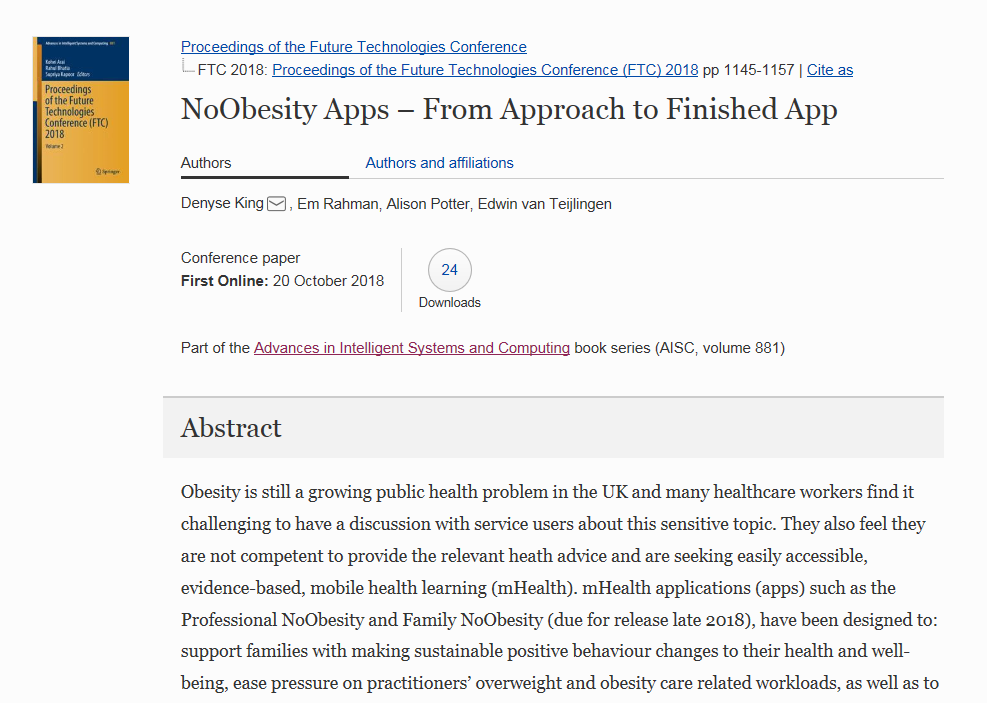
Reference:
King D., Rahman E., Potter A., van Teijlingen E. (2019) NoObesity Apps – From Approach to Finished App. In: Arai K., Bhatia R., Kapoor S. (eds) Proceedings of the Future Technologies Conference (FTC) 2018. FTC 2018. Advances in Intelligent Systems and Computing, vol 881. Springer, Cham, pp. 1145-1157.












 Bournemouth University psychologists publish new book
Bournemouth University psychologists publish new book Connecting Research with Practice: FoodMAPP Secondment in Austria and France
Connecting Research with Practice: FoodMAPP Secondment in Austria and France Health promotion paper read 8,000 times
Health promotion paper read 8,000 times The Beautiful Work Challenge: On Birth
The Beautiful Work Challenge: On Birth Free event on Solutions to Inequalities in Dementia Diagnosis and Care
Free event on Solutions to Inequalities in Dementia Diagnosis and Care MSCA Postdoctoral Fellowships 2025 Call
MSCA Postdoctoral Fellowships 2025 Call ERC Advanced Grant 2025 Webinar
ERC Advanced Grant 2025 Webinar Horizon Europe Work Programme 2025 Published
Horizon Europe Work Programme 2025 Published Horizon Europe 2025 Work Programme pre-Published
Horizon Europe 2025 Work Programme pre-Published Update on UKRO services
Update on UKRO services European research project exploring use of ‘virtual twins’ to better manage metabolic associated fatty liver disease
European research project exploring use of ‘virtual twins’ to better manage metabolic associated fatty liver disease